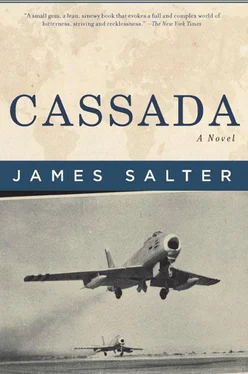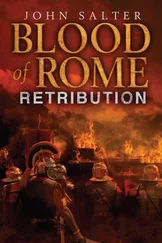“It’s true.”
“You’re getting to see it in everybody. Look at me, do I have it, too? If I don’t, I’m going to be worried.”
Wickenden had his eyes on the lighter held in his lap, lifting the lid and snapping it down. He knew certain things. Nothing could change them.
“You know more about flying than he does, don’t you?” said Isbell.
“Yes.”
“You spent four years,” Wickenden’s eyes shot up at this, alert at the number, “learning leadership among other things, didn’t you? They were still teaching that up there, weren’t they?” He could see Wickenden taking the inside of his cheeks between his teeth. “Well, weren’t they?”
“You know just what they teach.”
“I should.”
Wickenden clapped it again.
“You’re the senior flight commander,” Isbell said. “Ops officer is the next step. If I weren’t here you’d probably be ops officer. You’d be telling your flight commander the same thing: take care of this man. Find a way.”
Silence.
“What more do you want?” Isbell asked.
“All right, sir.” He was chewing on the walls of his mouth. The three words were an ancient, a cadet formula.
“Who else should I give him to?”
Wickenden sat motionless.
“Who would you suggest?”
“It wouldn’t matter who you gave him to. There’s a hierarchy…”
“A what?”
“A hierarchy of knowing.”
“What is this, some Eastern religion?”
“And he doesn’t know where he is in it. He won’t ever know.”
Isbell rubbed his ear and seemed as if he might sigh. Without another word Wickenden got up to go. Isbell nearly stopped him but they had been through things before. There came a point where nothing that was said made a difference. Wickenden would stand silently, wearing intransigence like a coat of arms.
He walked out the door.
“Wick!” Isbell called, the tone half apology.
But Wickenden chose not to hear.
Late in the fall ten planes went to Munich again to take over the alert from Pine’s squadron which had been there a month. There was, for a moment, the lapping of two cultures, a few words here and there, a greeting, a taunt. Squadrons were distinct. They were identical and unique. Pine had been known, when asked for a favor by a rival squadron, to say, what do I get in return?.
Isbell, one foot on a chair, was being briefed and taking some notes, perhaps the name of a bar or a couple of telephone numbers he would post later. As soon as Pine and the rest of them left, he pointed to a broom in the corner. Phipps picked it up and began sweeping. Outside, the first engines of the departing planes were being started. Cassada, the pale imprint of an oxygen mask still on his face, kneeled with the dustpan. Isbell had gone.
“That’s right, lady,” Cassada muttered, “I’m a jet pilot.”
“Hold it flatter,” Phipps said.
In the barracks they dragged their bags along the wide hallway and banged open doors. At the far end there was an empty room. Phipps arrived first. In the top drawer of a bureau there were still matches, coat checks, halves of tickets—weeks of someone’s pockets emptied at two in the morning. Phipps was throwing them into the wastebasket when Dumfries appeared.
“Anybody in here yet?”
“No one but me,” Phipps said.
“Don’t you want the lights on?”
“What? No, leave them off. Cassada may be coming.”
Dumfries gave a confused smile and struggled in with his bag. He stood looking at the empty beds and finally chose one against the wall. He dropped his things on it and brushed himself off.
“They’re not all moved out yet,” he said.
“I know.”
“I heard Captain Pine say some of them were going to stay over for the weekend.”
“Is that so?”
“They must like it down here.”
“I guess they do.” Munich. The blue twilight, trollies rocking along the streets and shop windows coming alight.
“I’d want to go straight home. A month, that’s long enough.”
“If it’s the same as last time they’ll probably have to go through town with a press gang to get them out of here.”
“With what?”
“A press gang. You know what that is?”
“Oh, sure,” Dumfries said. “I just didn’t hear you.”
He unzipped one side of his bag and took out a framed photograph of his wife. She came from a very fine family, he had mentioned more than once. Her father was a dentist. By profession, as Dumfries put it. They had carpet even on the stairs.
He put the photograph on top of the bureau, then dug into the side compartment and found his hairbrushes. He placed them beside the photograph. They were better for you than a comb, he had told Phipps.
“Why is that?”
“Have you ever seen a bald horse?”
“A bald horse?”
“It’s because they brush them.”
Phipps watched as Dumfries unpacked and put his clothes away, drawer by drawer, hiding his camera among the undershirts. The Russians must have them, too, Phipps decided. That was the only reassuring thing. He could almost imagine it, steep, terrifying battles high over Berlin and all the Eugenes crying their pitiful I’ve lost you’s, turning hopelessly through the confusion and heading off in the wrong direction.
Through the doorway then, holding in front of him a single bag as taut from things inside as a sausage skin, came Cassada, the bag hitting his knees as he moved. He reached out in passing and switched on the light. Dumfries straightened up, startled. Cassada looked from one of them to the other. “What are you doing, saving electricity?” he said.
He dropped his bag. “This is great, being down here, isn’t it?” He began to pull things out of the bag, dropping them everywhere, looking for something. Finally he took hold of a towel and snaked it out and around his neck.
“What do you think about going into town?” he asked, sitting down and hooking his finger into his bootlaces, jerking them loose.
“How?” Phipps said.
“Drive. I had an airman in maintenance drive my car down.”
“Yeah, maybe. I’m going to eat here anyway,” Phipps said.
“Me, too,” said Dumfries.
“What for?” Cassada asked, still trying to find something. “We can eat in town. You have any soap?” he finally said.
“Is that what you’ve been looking for?”
“Here,” Dumfries said.
“Toss it.”
Cassada trapped it against his chest with one hand and went to shower.
Phipps and Dumfries walked to the club. It was just becoming dark. The trees had some wind in them. The branches quivered. A good-looking cashier, a girl with a downturned mouth, was still working at the club, counting out money from the cash drawer with long fingers, converting military scrip into deutsche marks. She wore a thin, gold wedding band, perhaps to deflect questions.
Dumfries hesitated in front of her. “Hi, Marianne,” he said. Unsure of how to continue, he examined the movie schedule posted there, his belly stuck out like a brewer’s. “We just got down here today,” he said. “We took over from the 72nd.”
She nodded but did not comment. Dumfries thought of something.
“Say, remember that wine you once told me about? Spot-lease? Well, I tried some of that.”
“Oh, yes?”
“It was good. Boy, I like good wine. That’s one thing about Europe.” He was smiling like a jazzman, a meaningless smile.
In the bar, in the dim light the pilots sat together. The dice were rattling.
“Hey, Phipps. Come on, you want to play?”
“You can’t lose in a big game,” someone said.
“Where’s Roberto?”
Cassada was known as a demon player given to wild calls.
Читать дальше












